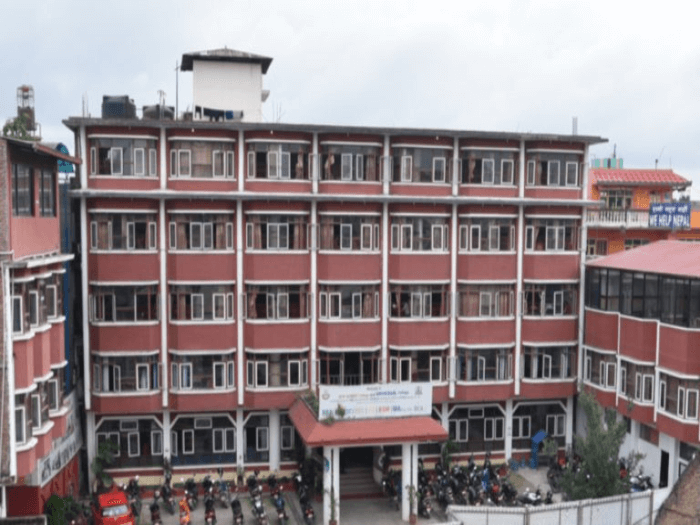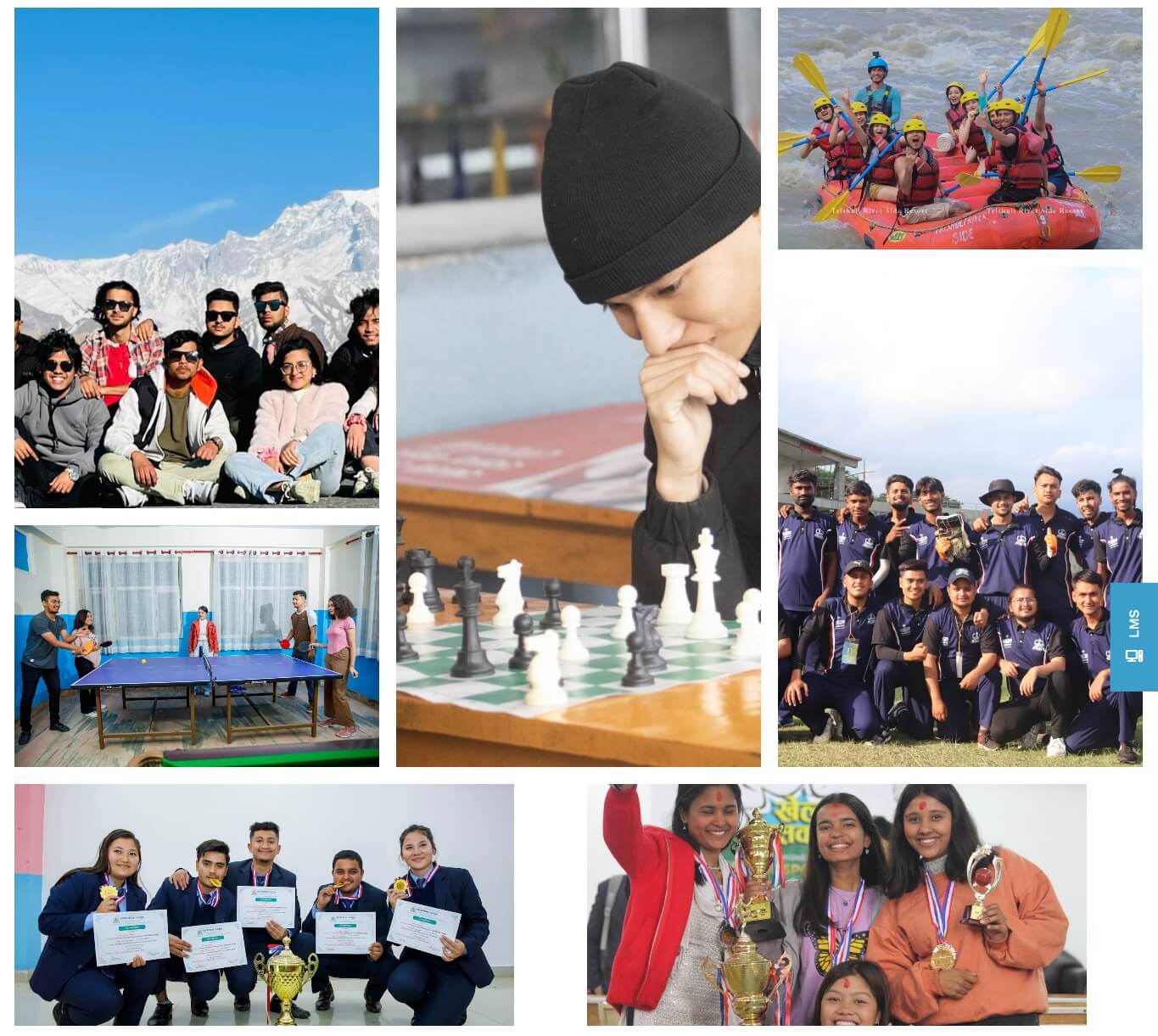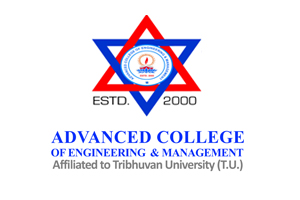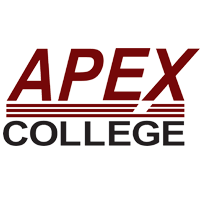Overview
Universal College (UC) is a Tribhuvan University–affiliated institution in Maitidevi, Kathmandu, offering undergraduate and postgraduate programs across Management, Humanities & Social Sciences, Information Technology, and +2 (Science and Management).
The college serves students from Nepal and abroad with academic programs such as BBA, BBM, BCA, BBS, BASW, BA, MBS, and MA English, along with +2 Science and +2 Management under NEB. Its campus combines structured learning, applied projects, and community engagement through clubs, industry links, and a peer-reviewed journal.

Introduction
Universal College is located near Maitidevi Chowk, Kathmandu. Established in 2054 BS and affiliated with Tribhuvan University, the college operates with an academic team focused on student growth in knowledge, skills, values, and leadership. Three campus buildings, technology-enabled classrooms, labs, and an e-library support daily teaching-learning, while seminars, workshops, and mentoring create a steady rhythm of academic and co-curricular activity.
The college highlights a mission that places student learning, ethical practice, collaboration, and problem-solving at the center. UC’s “4Cs” focus—communication, collaboration, critical thinking, and creativity—guides program activities, assessments, and student development across all levels.
Quick Highlights
-
Location: Maitidevi, Kathmandu (peaceful, accessible neighborhood).
-
Affiliation: Tribhuvan University (TU) for BBA, BBM, BCA, BBS, BASW/BA, MBS, MA English; NEB for +2 Science/Management.
-
Established: 2054 BS; long-running programs include BBS (since 2054 BS), MA English (since 2062 BS), BBA (since 2061 BS).
-
Signature Events & Platforms: Kathmandu Youth Conclave (KYC) leadership event; The Harvest peer-reviewed research journal.
-
Facilities: 3 buildings; technology-enabled classrooms; computer labs; e-library with journals; auditorium (approx. 100 seats); cafeteria; Wi-Fi; indoor games; podcast room.
-
Student Support: Mentoring, placement cell, industry exposure, skill certificates, internships, alumni network.
-
Clubs & Cells: Readers’ Club, Volunteers’ Club, Sports Club, Business Club, Leadership Club, Placement Cell, Entrepreneur Cell, Resource Point, Knowledge Centre, IT/Business Incubation.
-
Academic Recognition: Consistent results and TU toppers (e.g., BBA GPA 4.00 in 2080/81).
Academic Programs Offered
UC offers degree options that map to diverse interests and career routes. Below is a concise, student-focused view to help you compare goals, structures, and typical outcomes.
Bachelor of Business Administration (BBA)
-
Duration: 4 years (8 semesters)
-
Focus: Foundational management education with specializations (e.g., International Business, Finance, Marketing, Computer Information Systems).
-
Learning: Cases, projects, field visits, stock market training, and presentation clinics; career-readiness activities per semester plan.
-
Career Scope: Roles across banking, finance, marketing, HR, consulting, and corporate services; optional MBA later.
What stands out: A structured sequence of co-curriculars—from Excel and SPSS exposure to digital marketing training—builds practical fluency step by step.
Bachelor of Business Management (BBM)
-
Duration: 4 years (8 semesters)
-
Focus: Decision-making, leadership, operations, and entrepreneurship; strong orientation to dynamic business settings.
-
Learning: Business writing clinic, finance workshops, court visits, plan competitions, and SPSS training.
-
Career Scope: Business analysis, sales and marketing, HR, finance, and entry-level management roles; pathway to MBM/MBA.
Bachelor of Computer Applications (BCA)
-
Duration: 4 years (8 semesters)
-
Focus: Programming, web/application development, databases, networking, and software lifecycle skills; English as the medium.
-
Co-curricular Ladder: HTML/CSS/JS and graphics → PHP framework → Java/.NET → CCNA/CCNP → React/Python → ML/Data Science → LaTeX & personal development → internship/job assistance.
-
Career Scope: Software developer, web/app developer, QA, system admin, database admin, cybersecurity, and related roles.
Bachelor of Business Studies (BBS)
-
Duration: 4 years (annual exam system)
-
Focus: General Management, Marketing, Finance & Accountancy, or Management Science; reality-based business skills.
-
Learning: Presentations, guest lectures, computer modules, project work, banking training, and writing/interview sessions (BBS Pro).
-
Career Scope: Banking, corporate accounts, sales/marketing, and public/private sector roles; feasible cost profile.
Bachelor of Arts (BA)
-
Duration: 4 years
-
Focus: Humanities & Social Sciences with two major subjects and electives; compulsory English, Nepali, and Nepal Studies.
-
Evaluation: Boards (70%) + internal work (30%) via projects, presentations, and discussions.
-
Career Scope: Teaching, writing, media, development work, research, public services, and postgraduate study.
Bachelor of Arts in Social Work (BASW/BSW)
-
Duration: 4 years
-
Focus: Field-based learning in advocacy, community practice, policy awareness, and research; ethical and reflective practice.
-
Career Scope: NGOs/INGOs, government social services, development projects, community health and rights-based initiatives.
Master of Business Studies (MBS)
-
Duration: 2 years (4 semesters)
-
Focus: Accounting, Finance, Marketing, General Management; case work, projects, and presentations for applied decision-making.
-
Outcomes: Middle-management readiness, research orientation, and pathways to teaching or consultancy.
MA in English
-
Duration: 2 years (4 semesters)
-
Focus: Literature, language, media, cultural studies, and critical theory; research-oriented learning with an optional thesis.
-
Outcomes: Education, publishing, communications, research, and civil services.
+2 Programs (NEB)
-
Streams: Science and Management
-
Environment: High-speed internet, computer labs, digital classrooms, science labs, library, cafeteria, and ample sports area.
Admission Process
General approach (TU programs):
-
Follow TU policies and yearly notices for each program.
-
Competitive entrance tests apply for selected programs; shortlisted candidates may face interviews.
-
Admission decisions consider academic records, test results, and program capacity.
+2 (NEB):
-
Merit-based intake aligned to NEB guidelines.
-
Minimum grade requirements and, where applicable, college screening procedures.
Note: For the most current intake rules, deadlines, and entrance formats, check TU/NEB notices and the college admissions desk during the admission window.
Teaching Faculty and Learning Methodology
-
Faculty team: Experienced instructors and professionals bring field cases, local business scenarios, and research tasks into class discussions. The one-to-one approach in classrooms encourages students to question, analyze, and present.
-
Academic activities: Tutorials, seminars, presentations, case analysis, simulations, talk series, research writing, journal contributions, and structured field visits.
-
Skill stack: Soft skills (communication, teamwork, leadership), quantitative tools (Excel/SPSS), domain workshops (finance, marketing, entrepreneurship), and digital skills (coding, analytics).
-
Internships & placement: Work-ready internship modules and a placement cell maintain links with employers and recruitment agencies; job fairs and mentoring help students transition to work.
Infrastructure and Learning Facilities
-
Campus & buildings: Three dedicated buildings with classrooms configured for lectures, presentations, and multimedia use.
-
E-library & reading: Access to books, journals, newspapers, and selected international magazines; campus-wide internet/Wi-Fi.
-
Laboratories: Computer labs for all programs; science labs for +2; podcast and indoor activity rooms.
-
Auditorium & cafeteria: A multi-purpose hall (around 100 seats) hosts talks and workshops; cafeteria provides hygienic meals across the day.
-
Resource & incubation: Resource Point, Knowledge Centre, and Business/IT Incubation support project work, writing, entrepreneurship attempts, and collaborative learning.
Student Life and Campus Experience

The student experience balances academics with exploration. Students participate in themed talk series, article writing, business simulations, and outdoor excursions. Facilities for games and sports bring variety to the week, while student testimonials consistently mention a supportive climate and approachable faculty.
A structured mentoring system helps you reflect on goals, build a portfolio, and find suitable internships. The alumni cell maintains connections and showcases career pathways across sectors—useful for career conversations and peer networking.
Extracurricular Activities (ECA)
-
Clubs & cells: Readers’ Club, Volunteers’ Club, Sports Club, Business Club, Leadership Club, Placement Cell, Entrepreneur Cell, Resource Point, Knowledge Centre, and incubation platforms. Activities include book reviews, simulations, Friday Talk Series, campaigns, and inter-college competitions.
-
KYC (Kathmandu Youth Conclave): A national youth leadership event curated by the college, featuring speakers, cultural segments, and practical showcases for student initiatives such as a startup pavilion and skill hubs.
-
Sports & recreation: Annual tournaments (e.g., TU BBA Cup T20 Cricket), indoor games, and fitness-oriented events led by the Sports Club.
-
Journal & research: The Harvest (peer-reviewed) encourages research writing and publication among students and faculty.
Scholarships and Financial Support
-
Scholarship outlook: Students may access merit-based and need-based opportunities; scholarship titles and criteria are updated by the college administration.
-
How to proceed: During admission counseling, ask for the current list of scholarship schemes, eligibility, required documents, deadlines, and continuation rules.
-
Tips: Keep transcripts and entrance scorecards ready; clarify if awards are renewable each year and whether academic standing or attendance affects them.
(Scholarship specifics vary by intake. Use the admissions office as the authoritative source for the current cycle.)
Achievements and Institutional Milestones
-
Program timeline: Longstanding TU-affiliated programs (e.g., BBS since 2054 BS; BBA since 2061 BS; MA English since 2062 BS; MBS since 2074 BS; BCA since 2076 BS; BBM since 2077 BS).
-
Academic results: Recognized outcomes across cohorts, including TU BBA toppers who achieved GPA 4.00 in 2080/81.
-
Events & recognition: KYC leadership series; Inter-College TU BBA Cup T20 champions; ongoing publications and workshops through The Harvest and department-level events.
Why Study in Universal Collge?
1) Location & access
In-city campus at Maitidevi with transport convenience for day and morning shifts.
2) Program breadth with clear ladders
Multiple TU programs and +2 strands let you choose a route that fits your interests—business, IT, humanities/social work, or pre-university science/management.
3) Activity-rich learning
Structured skill modules, field visits, simulations, stock market workshops, coding stacks, and research writing experiences.
4) Mentoring, internships, and placement
Advising, job fairs, and employer links support the move from classroom to the first role; internship planning begins early in degree pathways.
5) Clubs, events, and networks
KYC, sports, readers’ initiatives, and alumni connect you with peers and professionals across domains.
6) Research culture
A peer-reviewed journal encourages writing and inquiry, strengthening your profile for higher studies and research careers.
Admission Tips (Actionable)
-
Map goals to programs:
-
Business careers with specialization → BBA/BBM
-
Software/IT roles → BCA
-
Accounts/management with cost-sensitive plan → BBS
-
Humanities/social impact → BA/BASW
-
Postgraduate growth in business or English studies → MBS/MA English
-
-
Check entrance windows: Track TU and college notices early; prepare for quantitative/verbal reasoning where required.
-
Build a lean portfolio: Keep a two-page CV, entrance prep notes, and a list of your activities and projects to discuss during interviews.
-
Ask about labs & workshops: Confirm availability for your chosen track—coding labs for BCA, finance/analysis sessions for BBA/BBM/BBS, research circles for BA/BASW/MA English.
-
Clarify fees and scholarships: Request a written breakdown of fees, refund policies, and scholarship terms for transparency.
Student Support and Well-Being
-
Academic support: Resource Point and Knowledge Centre help with writing, case analysis, presentation, and problem sets.
-
Personal guidance: Mentors and counseling services assist with adjustment, study routines, and decisions about internships or further study.
-
Community service: Volunteers’ Club and social work activities nurture empathy and responsibility through campaigns and local projects.
Governance and Quality Culture
-
Vision & mission: Emphasis on skill, values, leadership, and cultural grounding alongside global awareness.
-
Faculty development: Periodic training keeps teaching practices current and student-centered.
-
Industry and global exposure: Company visits, talks with practitioners, and exposure to international practices where feasible.
-
Alumni engagement: The alumni cell maintains profiles and events for networking, graduate support, and knowledge sharing.
Program-Wise Snapshots (At-a-Glance)
BBA / BBM
-
Semester activities: case writing, finance workshops, stock market sessions, digital marketing, entrepreneurship modules, and job fairs.
BCA
-
Progressive tech ladder: web foundations → frameworks → networking → modern stacks (React/Python) → machine learning/data science → internship.
BBS (BBS Pro)
-
Annual structure with add-on skills: presentations, guest lectures, computer courses, and banking training; cost-efficient path with wide job options.
BA / BASW
-
Field learning, evaluation mix, community exposure, and research writing, aligning with public roles and development sectors.
MBS / MA English
-
Postgraduate depth and research orientation; project work, presentations, and optional thesis pathways that open careers in management, education, writing, media, and research.
+2 Science / Management
-
NEB curriculum supported by labs, digital classrooms, and sports; strong base for engineering, medicine, IT, business, and humanities degrees.
Practical Questions to Ask During Counseling
-
What are the current entrance test formats and dates for my program?
-
Which labs, software, or platforms will I use in Year 1 and Year 2?
-
How are internships arranged, and what proportion of students secure paid roles?
-
Can I see recent issues of The Harvest and samples of student projects?
-
Which clubs are most active in my field, and how do I join?
-
Which scholarships are open this intake, and what are the renewal criteria?
Conclusion
Universal College offers a structured environment for academic growth and practical exposure in the heart of Kathmandu. With TU affiliation across multiple programs, NEB +2 options, strong co-curriculars, and an active network of clubs and alumni, the college helps students build academic depth, applied skills, and a credible portfolio for work or further studies.
Contact Universal College's administrative office for detailed information on the course, admissions, location, fees, scholarships, facilities, counseling, or eligibility.
Contact Details
Universal College
Maitidevi Chowk, Kathmandu, Nepal
Phone: +977-1-4520912, +977-1-4542775, +977-1-4528321, +977-1-4539810
Email: universalbbabbs@gmail.com
Website: www.uc.edu.np

















